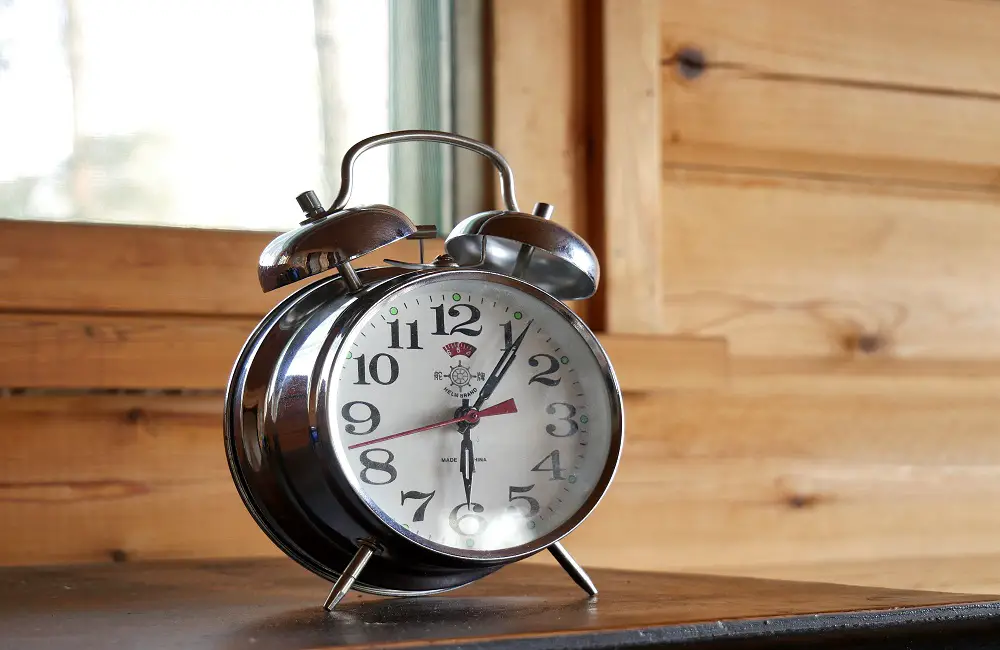In today’s fast-paced world, it’s easy to get lost in the hustle and bustle of everyday life. With so many responsibilities to handle, it’s important to have some structure in place to ensure that we stay on track.
One such tool that helps us maintain a routine is an alarm clock. Alarm clocks have become a fundamental part of our daily lives, helping us wake up on time and kick start our day. In this blog post, we’ll explore the importance of alarm clocks and why they are a vital addition to your daily routine.
Why Is Alarm Clock So Important?
So, what are the reasons why an alarm clock is a must-have in your bedroom? What benefits can an alarm clock give you? Let’s find out!

1. Helps To Regulate Sleep Schedule
Having a consistent sleep schedule is crucial for good health. An alarm clock not only wakes you up in the morning but also helps regulate your sleep schedule. It helps your body get into a rhythm of waking up at the same time every day, which can improve the quality of your sleep.
2. Time Management
Time management is key to productivity. Alarm clocks help you wake up in time to start your day, which helps you accomplish your tasks on time. It’s important to remember that time is a valuable resource that cannot be regained. Alarm clocks help you use your time wisely.
3. Prevents Oversleeping
Oversleeping can affect your health and even lead to depression. However, an alarm clock helps you wake up on time and prevents you from oversleeping.
4. Prepares your body for the day
Rousing yourself out of bed in the morning may seem like a daunting task, but an alarm clock helps in preparing your body for the day. It signals your body to become active, which can lead to improved energy levels and a sharper mind.
5. Helps You Stay Organized
Organizing your day starts with waking up on time. An alarm clock helps you stay organized by providing you with a head start on your day. It gives you enough time to prepare yourself for the day ahead.
6. Helps Establish a Routine
A morning routine is a great way to jumpstart your day. An alarm clock helps to establish a morning routine, which can lead to better time management. Furthermore, it can result in better stress management because it can give you a solid start to your day.
7. Ensures Punctuality
Trains, buses, and appointments all have specific times, and punctuality is necessary. An alarm clock ensures that you don’t miss an important meeting or appointment. It ensures that you reach on time and reduces the stress of being late.
Do You Need An Alarm Clock In Your Bedroom?
Many people argue that alarm clocks are harmful to our health and wellbeing. Sleeping beside an alarm clock can disrupt our sleep patterns and the loud, sudden noise can cause stress and anxiety.
Furthermore, starting off our day with a jolting and alarming wakeup call can dampen our moods and set us up for a stressful day. If you are feeling stressed in the morning, a gentler wake-up method may be more beneficial for you.
On the other hand, advocates of the classic alarm clock argue that they are a necessity for many people. Without an alarm clock, many of us would oversleep and be late for work, school, or appointments. Additionally, for those who struggle with time management, a loud wakeup call is sometimes the only way to get them moving in the morning.
For those looking to steer away from traditional alarm clocks, there are alternate methods to wake up that may be more gentle and less intrusive. For example, using a light alarm clock can simulate a sunrise in your bedroom, gradually getting brighter and brighter until you wake up naturally.
There are also apps that play calming sounds or music to bring you out of your sleep in a more peaceful manner.
Of course, if you are someone who needs the reliability of an alarm clock, there are smart clocks that may be a happy medium.
These devices track sleep patterns and wake you up at the optimal time during your sleep cycle, avoiding the residual grogginess that comes with being ripped out of a deep sleep.
Disadvantages Of Alarm Clock

1. Interrupted Sleep Patterns
One of the biggest drawbacks of using an alarm clock is that it can interrupt your natural sleep patterns. Our bodies are designed to fall asleep and wake up according to natural circadian rhythms, but when we rely on an artificial sound to wake us up, we are not giving our bodies the chance to follow these patterns. This can lead to feelings of grogginess and fatigue throughout the day.
2. Increased Stress Levels
From the moment an alarm clock goes off, it creates an aura of stress in the room. This leads to a spike in cortisol levels, which can have serious repercussions for our bodies. Increased cortisol levels are associated with weight gain, high blood pressure, and even heart disease. Over time, this chronic stress can become a serious health concern.
3. Disruptive To Partner
If you share a bed with someone, an alarm clock can be a major source of tension. If your partner has a different sleep schedule than you, or if they wake up more easily, the sound of your alarm can be deeply disruptive to their sleep. This can create resentment and arguments, leading to a strained relationship.
4. Decreased Productivity
When we use an alarm clock to force ourselves awake, we are often not getting the amount of sleep that we need in order to feel truly rested. This can lead to decreased productivity and focus throughout the day. We might find ourselves struggling to concentrate at work or school, or unable to complete tasks as efficiently as we normally would.
5. Over-Reliance On Technology
Finally, using an alarm clock every day can lead to an over-reliance on technology. We become accustomed to having a machine wake us up each morning, rather than being attuned to our own natural rhythms. Rather than relying on an alarm clock, it’s important to take steps to support our natural sleep patterns, such as implementing a consistent sleep schedule and practicing good sleep hygiene.
Types Of Alarm Clock
These are the 5 types of alarm clock that you need to look for. Let’s check them out!
1. Digital Alarm Clocks
Digital alarm clocks are one of the most common types of alarm clocks. They are easy to read, and their features are relatively simple and straightforward. These clocks have an LCD display with bright numbers that show the time. They come with snooze features, which let you enjoy a few extra minutes of sleep before the alarm sounds again. In addition, many digital clocks have a built-in flashlight, making them a useful tool for emergencies.
2. Analogue Alarm Clocks
An analogue alarm clock has a classic look that complements any interior decor. They operate using a set of gears and cogs, which means they don’t rely on electricity to function. These clocks have a ticking sound that may be soothing to some people. However, not everyone likes the ticking noise, and for those with sleeping disorders, it can be quite disturbing. Analogue alarm clocks can be challenging to set, but once you figure it out, they are reliable and functional.
3. Projection Alarm Clocks
A projection alarm clock has a unique feature that many other types of clocks do not: the ability to project the time onto the ceiling or wall. This makes reading time much easier. In addition, if you wake up in the middle of the night and need to check the time, you won’t have to turn on the light and disturb your partner. Projection alarms mostly come with various customization features, including the ability to set the projection orientation, brightness, and color.
4. Sunrise Alarm Clocks
A sunrise alarm clock, also known as a wake-up light, is a popular type of alarm clock that simulates a sunrise to wake you up. These clocks have a gradual light that increases in intensity, mimicking the rising sun. This type of alarm clock is ideal for people who find it challenging to wake up to a loud, abrupt alarm sound. Sunrise alarms are believed to help regulate our circadian rhythms, which, in turn, can help us get better sleep.
5. Smart Alarm Clocks
Smart alarm clocks are becoming increasingly popular in the digital age. They are connected to your smartphone or tablet and can access the internet to provide you with information about the weather, traffic, and news. They also have customizable features, such as voice-activated commands and security surveillance. Smart alarm clocks are designed to integrate technology into our daily routines to make our lives more comfortable and convenient.
Final Verdict
Alarm clocks are essential for maintaining a consistent sleep schedule, enhancing productivity, reducing anxiety and stress, building better habits, and enabling better time management. Allocating an adequate amount of time for things we want to do and need to do is crucial for success and well-being.
Although there are always exceptions, and life sometimes makes waking up on schedule tricky – from power outages to alarm malfunctions – having an alarm clock as part of our routine is essential to a smooth daily schedule. In conclusion, ensure that the alarm clock is a prominent part of your daily routine, and watch it work its charm in your daily life.

